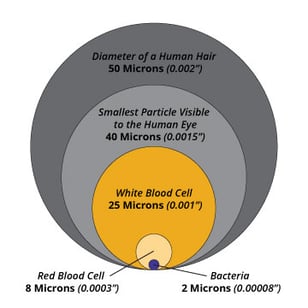Have you ever looked at two water filters that seem to be the same but have different part numbers? This is because they have different micron ratings. In order to select the perfect filter for your water filtration system, you will need to consider what micron rating is required.
In this blog, we will explore what a micron rating is, why you should know the difference between nominal and absolute micron ratings and tips for choosing the right micron rating for your water filtration requirements.
What is a Micron Rating?
To understand what a micron rating is, we first need to understand what a micron is. A micron is short for micrometer or one millionth of a meter. 
The micron rating refers to the distance between pieces of filter media. This determines the size of particles that the filter will allow to pass through.
A 50 micron rated filter will allow larger particles to pass through than a 5 micron rated filter. Common micron ratings for filters are 100, 75, 50, 25, 10, 5, 1 and 0.5.
The Difference Between Nominal and Absolute Micron Rating
Filters work in different ways in order to filter different contaminants. The amount that will get removed during water filtration depends on whether a nominal or absolute filter is used.
Nominal
A nominal micron rating is the effectiveness of a filter to retain the majority of particulate at the specified micron size. This amount can vary from 60 to 98% depending on the test environment, manufacturer of the filter and concentration of the contaminant.
Nominal rated water filters are used for disinfecting and removing particulate, chlorine and it’s by-products, chemicals, as well as for taste and odor applications.
Carbon filters can be considered nominal rated filters.
Absolute
Just as it's name would signify, an absolute micron rating retains 100% of particulate at a specified micron rating. Test conditions for these are more defined, including: particle size, pressure, concentration, and detection method used to identify the contaminant.
These water filters are used where it is critical for all contaminants to be removed such as sterilizing and final filtration.
Pleated filters can be considered absolute rated filters.
Choosing the Right Micron Rating
When considering the micron rating for your water filtration system here are some things to consider.
- Know what needs to come out. Knowing what is in your water is the first step in determining what micron rating the water filter has to be. It is important to note how critical it is to remove all contaminants. Ask yourself, would a nominal micron rated filter do, or is an absolute one required?
- Smaller isn't always better. The smaller the micron rating, the more contaminants will be removed. That being said, flow rate loss is a possibility. To ensure there is little to no flow loss, a filter with a higher micron rating or a larger pump is required.
- Filters get dirty. Everything coming out of the water stays in the filter. Depending on the state of the water going through the filter, it may need to be replaced more often if it has a smaller micron rating.
In Conclusion:
No matter what your filtration job is, there is a filter out there with the perfect micron rating.
Have further questions about this subject?
Head over to Boshart's Knowledge Base: technical product information, guidelines, and more.




.jpg)
SHARE